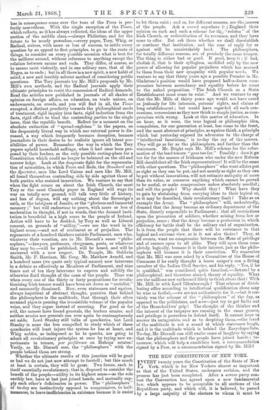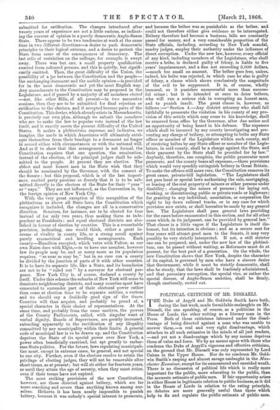THE NEW CONSTITUTION OF NEW YORK.
EVERY twenty years the Constitution of the State of New York, which is for New Yorkers almost as important as that of the United States, undergoes revision, and the process has just been completed. After a severe party con- test the Convention has agreed upon a new fundamental law, which appears to be acceptable to all sections of the Republican party, and which will, it is believed, be passed by a large majority of the electors to whom it must be submitted for ratification. The changes introduced after twenty years of experience are not a little curious, as indicat- ing the current of opinion in a purely democratic Anglo-Saxon State. There appear to be two tendencies at work at the same time in two different directions—a desire to push democratic principles to their logical extreme, and a desire to protect the State from some of the consequences of democracy. The last relic of restriction on the suffrage, for example, is swept away. There was but one, a small property qualification exacted from coloured persons, and this is quietly, but signifi- cantly omitted. Then, the great difficulty of the Union, the possibility of a jar between the Constitution and the people— the unchanging document and the mobile opinion—is provided for in the most democratic and yet the most English way. Any amendments to the Constitution may be proposed in the Legislature, and if passed by a majority of all members elected —not, like other Bills, of all present—in two successive sessions, then they are to be submitted for final rejection or ratification to the electors, and if accepted become parts of the Constitution. This device, which already exists in Massachusetts, is precisely our own plan, although we submit the members who are to make the law to popular vote instead of the law itself, and it exactly meets the present difficulty of the United States. It makes a plebiscitum supreme, and indicates, we imagine, the mode in which Americans will ultimately extri- cate themselves from their bondage to a document no longer iri accord either with circumstances or with the national will. And as if to show that this arrangement is not formal, the Constitution requires that one question, the nomination, instead of the election, of the principal judges shall be sub- mitted to the people. At present they are elective. The ablest and most honest men in the State wish that they should be nominated by the Governor, with the consent of the Senate ; but this proposal, which is of the last import- ance, excited party passions so fiercely that it is to be sub- mitted directly to the electors of the State for their " yeas " or"nays." They are not influenced, as the Convention is, by the foreign opinion of New York City.
With the very great exception of this recognition of the plebiscitum as above all State laws, the Constitution which recognizes it included, the changes are all in a conservative direction. Senators, for instance, are to be elected for four instead of for only two years, thus making them as inde- pendent as Presidents ; and equal electoral districts are abo- lished in favour of election by counties. This is a remarkable provision, indicating, one would think, either a great in- crease of vitality in county life, or a strong recoil against purely symmetrical and levelling arrangements. Each county—Hamilton excepted, which votes with Fulton, as our own Nairn does with Elgin,—is to have one member, however few its people may be, and as many more as its population requires, " as near as may be," but in no case can a county be divided by the junction of parts of it with other counties. It is to have its separate life, like a State, and its boundaries are not to be " ruled out " by a surveyor for electoral pur- poses. New York City is, of course, declared a county by itself. Under this scheme the suburbs of New York will cease to dominate neighbouring districts, and many counties must have consented to surrender part of their electoral power rather than cease at election time to be separate entities, a curious and we should say a decidedly good sign of the times. Counties will thus acquire, and probably be proud of, a special character in their choice of representatives. At the same time, and probably from the same motives, the powers of the County Parliaments, called, with singular want of verbal dignity, Boards of Supervisors, are greatly increased, extending apparently to the rectification of any illegality committed by any municipality within their limits. A general code of municipal law is to be drawn up, and the Constitution deprives the State of its special power over New York, a power often beneficially exercised, but apt greatly to embar- rass State politics. For the future, laws regulating municipali- ties must, except in extreme cases, be general, and not special to one city. Further, even if the electors resolve to retain the privilege of electing judges, they will not be removable after short terms, as at present; but will sit either for fourteen years, or until they attain the age of seventy, when they must retire, even if their terms have not expired.
The most striking provisions of the new Constitution, however, are those directed against bribery, which are far more searching and severe than anything known among our- selves. Hitherto it has been nearly impossible to punish bribery, because it was nobody's special interest to prosecute, and because the bribee was as punishable as the briber, and could not therefore either give evidence or be interrogated. Bribery therefore had become a business, bills are constantly passed for money, and a very considerable proportion of the State officials, including, according to New York scandal, sundry judges, employ their authority under the influence of direct corruption. Under the new law, however, every official of any kind, including members of the Legislature, who shall receive a bribe, is declared guilty of felony, is liable to five years' imprisonment, and a fine not exceeding 5,000 dollars, —much too small an amount. The briber goes free, unless, indeed, his bribe was rejected, in which case he also is guilty of felony, a clause which shows conclusively the magnitude of the evil to be suppressed. It is, of course, wholly immoral, as it punishes unsuccessful more than success- ful crime ; but it is intended at once to deter bribers, who will run a serious risk in corrupting an honest man, and to punish insult. The great clause is, however, as follows :—" Section 4.—Any district attorney who shall fail faithfully to prosecute the violation in his county of any pro- vision of this article which may come to his knowledge, shall be removed from office by the Governor, after due notice and an opportunity of being heard in his defence. The expenses which shall be incurred by any county investigating and pre- venting any charge of bribery, or attempting to bribe any State officer or member of the Legislature within such county, and of receiving bribes by any State officer or member of the Legis- lature, in said county, shall be a charge against the State, and their payment by the State shall be provided for by law." Anybody, therefore, can complain, the public prosecutor must prosecute, and the county bears all expenses,—three provisions which would very speedily extinguish bribery in Great Britain. To make the offence still more rare, the Constitution removes its great cause, private-bill legislation. " The Legislature shall not pass local or special laws authorizing the sale, mortgaging, or leasing of the real property of minors or other persons under disability ; changing the names of persons ; for laying out, working, or discontinuing public or private roads or highways; for granting to any individual, association, or corporation the right to lay down railroad tracks, or in any case for which provision now exists, or shall hereafter be made by any general law. The Legislature shall pass general laws providing for the cases before enumerated in this section, and for all other cases which, in its judgment, can be provided by general law." That clause is a little vague if the Legislature is itself dis- honest, but its intention is obvious ; and as a secure seat for four years will attract good men to the Senate, it may very possibly be very strictly interpreted. If not, a still stricter one can be prepared, and, under the new law of the plebisci- tum, can be passed without waiting, as Reformers must do at present, for the best part of a generation. On the whole, the new Constitution shows that New York, despite the character of its capital, is governed by men who have a sincere desire that Government, while it must be strictly democratic, shall also be steady, that the laws shall be fearlessly administered, and that pecuniary corruption, the special vice, or rather the special disease, of Anglo-Saxon societies, shall be firmly, though cautiously, rooted out.































 Previous page
Previous page